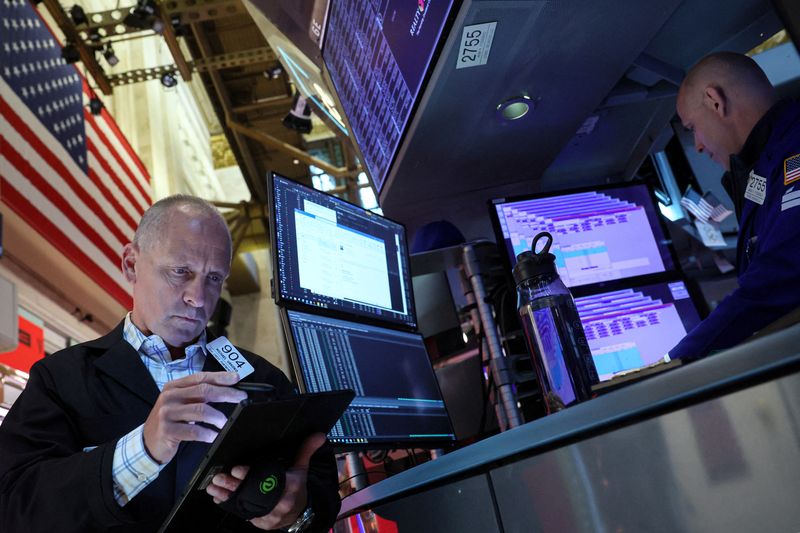By Ankika Biswas, Shubham Batra and Lisa Pauline Mattackal
(Reuters) - Wall Street rose on Monday, regaining some ground after the previous week's declines as investors assessed the odds of a second term for Republican nominee Donald Trump in the November election after President Joe Biden withdrew from the race.
Biden said on Sunday he was opting out and endorsed Vice President Kamala Harris's candidature. Online betting site PredictIT showed pricing for a Donald Trump victory slipped 4 cents, to 60 cents, while climbing 12 cents, to 39 cents, for a Harris win.
Stocks firmed after a three-session sell-off, with megacap shares gaining as the benchmark U.S. 10-year bond yield slipped after Biden's announcement.
Alphabet (NASDAQ:GOOGL), Microsoft (NASDAQ:MSFT), Apple (NASDAQ:AAPL) and Tesla (NASDAQ:TSLA) rose between 1% and 4.2%
The Information Technology index led sectoral gainers, with all the major sector indexes except Energy in the green.
At 9:37 a.m. ET, the Dow Jones Industrial Average was up 145.49 points, or 0.36%, at 40,433.02, the S&P 500 was up 47.57 points, or 0.86%, at 5,552.57, and the Nasdaq Composite was up 218.04 points, or 1.23%, at 17,944.98.
Trump-linked stocks were mixed, with Trump Media & Technology Group reversing premarket gains and slipping 0.2%, while software firm Phunware gained 0.6%.
Biden's exit could prompt investors to unwind trades on bets that a Republican victory would increase U.S. fiscal and inflationary pressures. But some analysts said markets could benefit from an increased chance of a divided government under the next administration.
"There might be a bit of an unwind of the pro-cyclical pro-small-cap trade we've seen if the odds of the race narrow a little bit," said Ross Mayfield, investment strategy analyst at Baird.
"But the rotation in the market has been more driven by disinflation and the potential for rate cuts and a soft landing, than anything political."
The question of who will be on the Democratic presidential ticket compounds investor uncertainty as they brace for a bevy of key quarterly earnings, including from two of the so-called Magnificent Seven companies - Google parent Alphabet and Tesla.
Their results will test whether the recent rally in top-tier high-momentum stocks is tenable and if a move to underperforming sectors will continue. The small-cap Russell 2000 gained 0.6%.
Crucial economic data is due through the week, including the Personal Consumption Expenditures Price Index - the Federal Reserve's preferred inflation gauge that is expected to shed light on the central bank's likely monetary policy path.
Traders have broadly priced in a 25-basis-point rate cut by September and two cuts by the year-end, according to LSEG and CME's FedWatch data.
Among single movers, Nvidia rose 2.8% after Reuters reported the AI chip leader was working on a version of its new flagship AI chips for the China market that would be compliant with current U.S. export controls.
Verizon Communications (NYSE:VZ) fell 5.4% after it missed second-quarter revenue expectations.
Cybersecurity firm CrowdStrike slipped 8.3% and was on track to extend losses after a software update from the company sparked Friday's global tech outage.

Advancing issues outnumbered decliners by a 3.08-to-1 ratio on the NYSE, and by a 2.55-to-1 ratio on the Nasdaq.
The S&P index recorded four new 52-week highs and no new lows, while the Nasdaq recorded 16 new highs and 17 new lows.